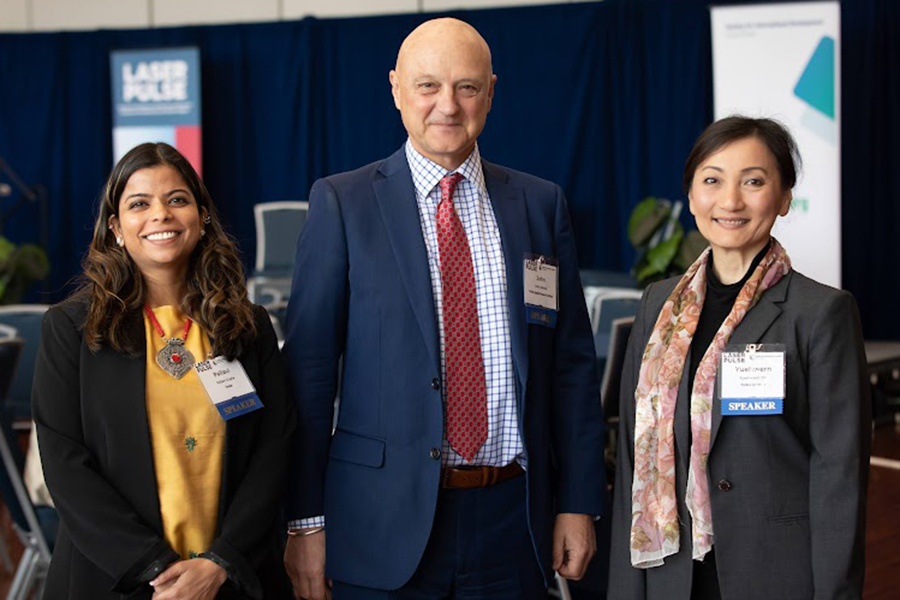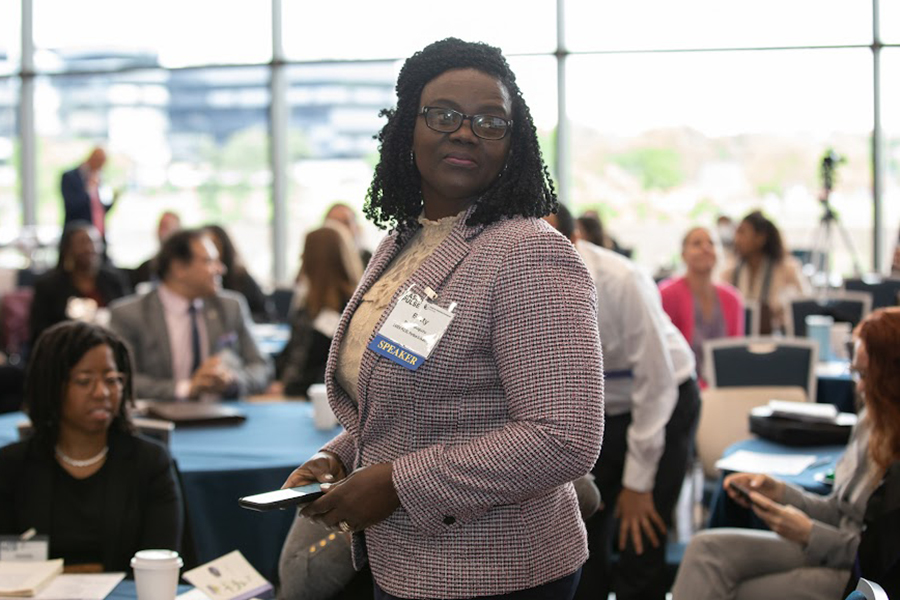LASER PULSE hosts summit in D.C., highlights research in education, food security, private sector engagement

The LASER PULSE consortium, funded by the U.S. Agency for International Development (USAID), recently convened in Washington, D.C., for an event designed to share the organization’s experiences and findings in its work to promote Higher Education Institution (HEI)-sourced research for decision making.
Representatives from Purdue University, Indiana University, University of Notre Dame, Catholic Relief Services, and Makerere University-ResilientAfrica Network, along with officials from USAID, conducted the USAID LASER PULSE Research for Development Summit May 2 at Howard University.
Other participants included donors, USAID Missions, Bureaus and Independent Offices (M/B/IOs), NGOs and members of the private sector.
“It is always our priority to provide an opportunity for our audience and our diverse partners to learn from one another,” said Pallavi Gupta, LASER PULSE program director.
Opening remarks were delivered by LASER PULSE Academic Director Yuehwern Yih, who also is a professor in the Purdue College of Engineering’s School of Industrial Engineering. She noted that development research, coupled with innovation, is at the peak of the ongoing work within HEIs. In addition, she said development research is a shared responsibility across partners and collaborators, and user-centered design is necessary for it to thrive even more.
“At this point, it is fulfilling that development research is informing policy, although there is a need to increase uptake of research outputs through cross-sectoral partnerships,” Yih said. “We all need to continue innovating in an effort to propose solutions to address the diverse community challenges so that together we can make a difference.”
Mohamed Abdel-Kader, chief innovation officer and executive director of the Innovation, Technology, and Research Hub at USAID, delivered the keynote address and shared that the efforts by and within HEIs need to be supported. He applauded HEIs for working closely with partners across the globe, adding that it is these partners who know more about the community challenges and local needs and can meaningfully contribute to the proposed solutions.
“We talk about this new age of being mindful in diversity, equity, and inclusion. What does that mean if our work isn’t accessible? This work needs to be open to communities around the world and not just tied up in an ivory tower,” Abdel-Kader said. He urged all summit participants to keep their operational doors open to international collaborations and research engagements to make a significant contribution to both science and non-science related work.
Abdel-Kader emphasized that development research and other partnerships are key for various reasons including the need to increase:
- The knowledge base
- Student opportunities to engage, learn, unlearn and relearn
- Multidisciplinary engagements that are vital for development research to thrive
Pallavi Gupta, program director of LASER PULSE, shared an overview and said that research requires the perspectives of different stakeholders, and to this end, the LASER PULSE consortium has brought together 3,200 researchers and practitioners across 86 countries. With funding from USAID, LASER PULSE supports 47 multidisciplinary projects in 19 countries. She stressed the need for dissemination of research outputs with an emphasis on defining the target audience to appropriately prepare the necessary information education and communication materials.
The event’s discussions included the food security and nutrition panel, which provided an opportunity to share the multidisciplinary projects being implemented across the globe with funding from USAID through LASER PULSE. For the first time, a nutrition glossary was developed both in English and the Lao language. The government of the Republic of Uganda was applauded for already allocating approximately $8 million annually to research. This commitment, participants recommended, should be embraced by other governments, too, so that development research is further supported to inform national and later international growth.
Education panel discussions included the University of Nairobi in Kenya’s Tusome (‘Let’s Read’) project, which has had spillover effects to other institutions and countries. Project implementation processes leveraged the Embedded Research Translation Model, and the Tusome case study report is currently being referenced as a successfully implemented program with transferable lessons on multilingual education internationally. It also was noted that LASER PULSE projects have taken care to ensure inclusion of people living with disabilities and the community-driven solutions they seek to be implemented.
During the economic growth and private sector engagement panel, participants discussed the importance of embracing and leveraging private sector engagement, adding that it plays a key role in contributing to the uptake of research outputs and funding different research aspects to complement the already secured and running funding. Participants also noted that the biggest challenge in creating, maintaining, and leveraging partnerships is outlining the benefits for each partner and communicating this early enough during the project inception stages.
LASER also shared lessons learned in working on this large USAID-funded program through consortium partner leads. This panel discussed leveraging LASER PULSE’s value proposition, the fact that universities provide a platform where local researchers can be leveraged, and the need for contributions from female researchers and junior faculty in the research ecosystem to achieve capacity strengthening.
The engagement with minority-serving institutions (MSI) panel noted the need to foster fellowship programs for the benefit of students, faculty, and institutional staff. Participants identified bottlenecks to engagements with MSIs, including: limited funding and passion, institutions working/operating in silos and thus not appreciating the fact that all can contribute to the general pool; and the need to support strategic partners to realize and appreciate what is in it for them.
Brent Wells, LASER PULSE team lead, closed the summit by calling all participants to action, saying, “Research informs decision making and thus strengthening the research capacity of local institutions is just the way to go in order for all of us to benefit.”
The full agenda and speaker information is available on the LASER PULSE website.

